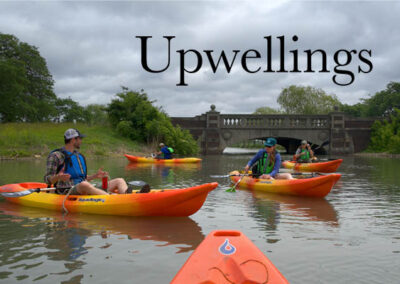 The “Watersheds in Your District” webpage is a resource for Michigan elected officials and residents looking to learn about the waterways in their area.
The “Watersheds in Your District” webpage is a resource for Michigan elected officials and residents looking to learn about the waterways in their area.
Michigan Sea Grant and the University of Michigan Water Center, in partnership with the Fred A. and Barbara M. Erb Family Foundation, produced a series of maps showing the overlap of Michigan’s state house and senate districts with the natural boundaries of the state’s watersheds.
A watershed is an area of land where all the rain and melting snow drains to a single body of water, such as a creek, river, or lake. Watersheds are a nested system; many creek watersheds may contribute to one river’s watershed, for example. Nearly all of Michigan’s watersheds eventually flow into one of the Great Lakes.
Healthy watersheds reduce flood risk, support crops, filter pollutants, mitigate effects of climate change, and boost human well-being. However, land-based activities can have detrimental impacts on watershed health. For example, rainwater or snowmelt flowing through urban areas can pick up trash, heavy metals, road salt, bacterial contamination, and excess heat before entering a river or stream. A watershed dominated by agriculture might experience high levels of nutrient or bacterial contamination from crop fertilizers or animal manure, leading to consequences like algal blooms and beach closures. Watersheds covered with paved surfaces are more vulnerable to flooding during moderate or severe storms.
By taking steps to address these issues in their districts, Michigan officials can preserve the health of their local watersheds. Residents who are aware of the watershed in which they live can encourage their state elected officials to take action to support the protection and restoration of Michigan’s water resources.
The “Watersheds in Your District” webpage is designed to explore the overlap of these human and natural boundaries to help Michigan officials make informed decisions about the waterways that flow through their districts. Downloadable PDFs show the boundaries of each Michigan House and Senate district and how they intersect with one or more local watersheds. The website also contains a contact list for watershed protection groups and environmental non-profits to help foster relationships and collaboration. The resources will be updated to reflect any future changes in district boundaries.
Find the webpage at michiganseagrant.org/districts
For local and elected officials looking for additional ways to foster their connection to local water resources, Michigan Water School is a policy-neutral, fact-based program that explores topics like water quality, quantity, policy, economics, and more. Workshops are held periodically, and a series of free articles and webinar recordings are available on the Michigan Water School website.


